

Nursing Department
What We Do
The Nursing Department at Utica University prepare nurses to excel in critical reflection, clinical competency, collaboration, caring, and leadership through evidenced based nursing science.
Office Location
238 White Hall
Welcome to the Nursing Department at Utica University!
OUR MISSION:
Our mission is to provide high quality, innovative, and transformational education to diverse learners and professionals to promote equitable healthcare. We prepare nurses to excel in critical reflection, clinical competency, collaboration, caring, and leadership through evidenced-based nursing science. Nurses prepared at Utica University are a vital component of the interprofessional healthcare team, providing safe, quality, and ethical care to diverse populations across the lifespan in a variety of settings.
OUR VISION:
The Utica University Department of Nursing will be recognized as an innovative center of nursing excellence for learners and professionals. The educators, clinicians, and researchers will inspire the next generation of nurse leaders to respond to the challenges of a dynamic and diverse healthcare environment encompassing the spheres of care.
Accreditation Visit Notice
Utica University will host an accreditation visit by the Commission on Collegiate Nursing Education (CCNE) on February 3 -5, 2025. The purpose of the visit is to seek continuing nursing accreditation of the Undergraduate, Graduate, and Post-Graduate APRN Certificate programs.
In accordance with the Commission on Collegiate Nursing Education (CCNE) accreditation procedures, interested parties may submit written comments concerning a program’s qualifications for accreditation. Written third-party comments regarding the Undergraduate, Graduate, and Post-Graduate APRN Certificate programs must be received by CCNE no later than January 13, 2025. Only signed comments are accepted by CCNE.
CCNE shares third-party comments with members of the evaluation team prior to the visit, but at no time during the review process are these comments shared with the program. During its review of the program, the evaluation team considers third-party comments that relate to the accreditation standards.
If you would like to submit a third-party comment for the programs currently under review, please submit to thirdpartycomments@ccneaccreditation.org, or you may mail comments to:
Commission on Collegiate Nursing Education
Attn: Third-Party Comments
655 K Street, NW, Suite 750
Washington, DC 20001
If you have any questions about this process, please contact CCNE staff at (202) 887-6791 ext. 268.
Program Goals
Prelicensure Program Goals
(Entry-Level Professional Nursing Education Core Sub-Competencies)
Traditional, RN-BS, ABSN, Advanced Standing, DEMSN programs
| 1. | Apply contemporary nursing knowledge as well as knowledge from other disciplines, including a foundation in liberal arts and natural and social sciences in the care of diverse patients within a variety of settings. |
| 2. | Provide evidence-based person-centered care that is holistic, individualized, just, respectful, compassionate, coordinated, and developmentally appropriate across the lifespan. |
| 3. | Engage in population health care activities from prevention to the management of health care needs across diverse populations through partnerships with communities, public health, government entities, and others to promote social justice and close the gap for health inequity for the improvement of population health outcomes. |
| 4. | Evaluate and apply nursing knowledge to inform practice, improve patient outcomes, and influence health care. |
| 5. | Apply established and emerging principles of quality and safety in the delivery of care as core values of nursing practice, to enhance quality and minimize risk of harm to patients and providers through both system effectiveness and individual performance. |
| 6. | Collaborate across professions and with care team members, patients, families, and communities, to optimize care, enhance the healthcare experience, and improve outcomes. |
| 7. | Utilizes available resources to coordinate safe, quality, and equitable care across diverse populations within complex systems. |
| 8. | Utilize informatics and healthcare technologies to inform care and deliver safe, high-quality, and efficient healthcare services in accordance with best practices and professional and regulatory standards. |
| 9. | Cultivate a sustainable professional identity that includes accountability, integrity, perspective, collaborative disposition, respect for others, inclusivity, and ethical comportment that reflect nursing’s characteristics and values. |
| 10. | Participate in activities and self-reflection that foster personal health, resilience, and well-being, contribute to lifelong learning, and support the development of nursing expertise and leadership qualities. |
Masters and Certificate of Advanced Study (CAS) End of Program Goals
(Advanced-Level Nursing Education Core Sub-Competencies)
MS-FNP, MS-Nursing Education, MS-Nursing Leadership, and FNP-CAS, Nursing Education-CAS, Nursing Leadership-CAS
| 1. | Integrate contemporary nursing knowledge as well as knowledge from other disciplines within the advanced nursing practice specialty within a variety of settings. |
| 2. | Manage evidence-based person-centered care that is holistic, individualized, just, respectful, compassionate, coordinated, and developmentally appropriate within the advanced nursing practice specialties. |
| 3. | Collaborate with communities, public health, government entities, and others to facilitate health equity from prevention to disease management and influence social justice for the improvement of population health outcomes. |
| 4. | Synthesize and disseminate nursing science to inform and support transformative health care. |
| 5. | Develop and lead safety initiatives to enhance quality and minimize risk of harm to patients and providers through both system effectiveness and individual performance. |
| 6. | Lead interprofessional collaboration efforts across professions and with care team members, patients, families, and communities, to optimize care, enhance the healthcare experience, and improve outcomes. |
| 7. | Lead initiatives to effectively use resources and provide cost-effective, safe, quality, and equitable care across diverse populations within complex systems. |
| 8. | Analyze and evaluate data to lead decision making and deliver safe, high-quality, and efficient healthcare services in accordance with best practices and professional and regulatory standards. |
| 9. | Model a sustainable professional identity that includes accountability, integrity, perspective, collaborative disposition, respect for others, inclusivity, and ethical comportment that reflect characteristics and values of the advanced nursing practice specialty. |
| 10. | Use self-reflection to mentor and lead activities that foster personal health, resilience, and well-being, contribute to lifelong learning, and support the development of nursing expertise and leadership qualities. |
The Nursing Program at Utica University

CCNE Accredited
- The baccalaureate degree program in nursing at Utica University is accredited by the Commission on Collegiate Nursing Education (http://www.ccneaccreditation.org).
- The master's degree program in nursing and post-graduate APRN certificate program at Utica University is accredited by the Commission on Collegiate Nursing Education (http://www.ccneaccreditation.org).
Nursing Program Resources
Undergraduate Nursing Tracks
Traditional Nursing (BS)
Accelerated BS in Nursing (ABSN)
FlexTrack BS in Nursing
RN to BSN
Graduate Nursing Tracks
Direct Entry MS in Nursing (DEMSN)
MS Family Nurse Practitioner
MS Nursing Education
MS Nursing Leadership
Nursing Certification Tracks
Family Nurse Practitioner Certificate of Advanced Study (CAS)
Nursing Education Certificate of Advanced Study (CAS)
Nursing Leadership Certificate of Advanced Study (CAS)
Traditional Bachelor of Science (BS) Nursing Program
Online RN to BSN Nursing Program
Accelerated Bachelor of Science Nursing (ABSN) Program
Advanced Standing Program (BS)
Graduate Nursing Program (MS)
Direct Entry Master of Science in Nursing (DEMSN)
Undergraduate Nursing Program Outcomes
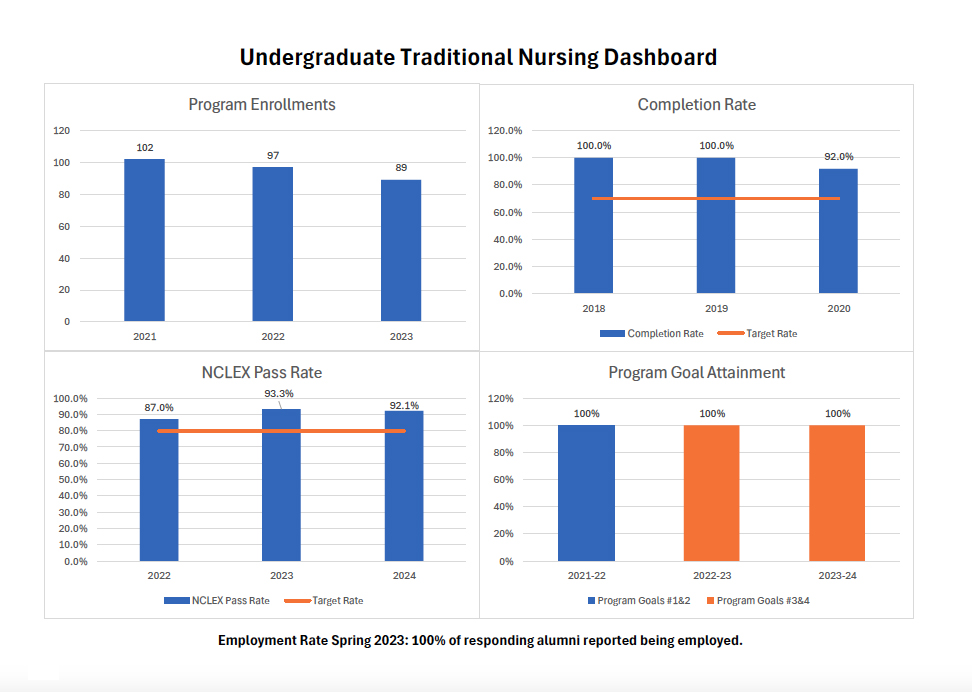
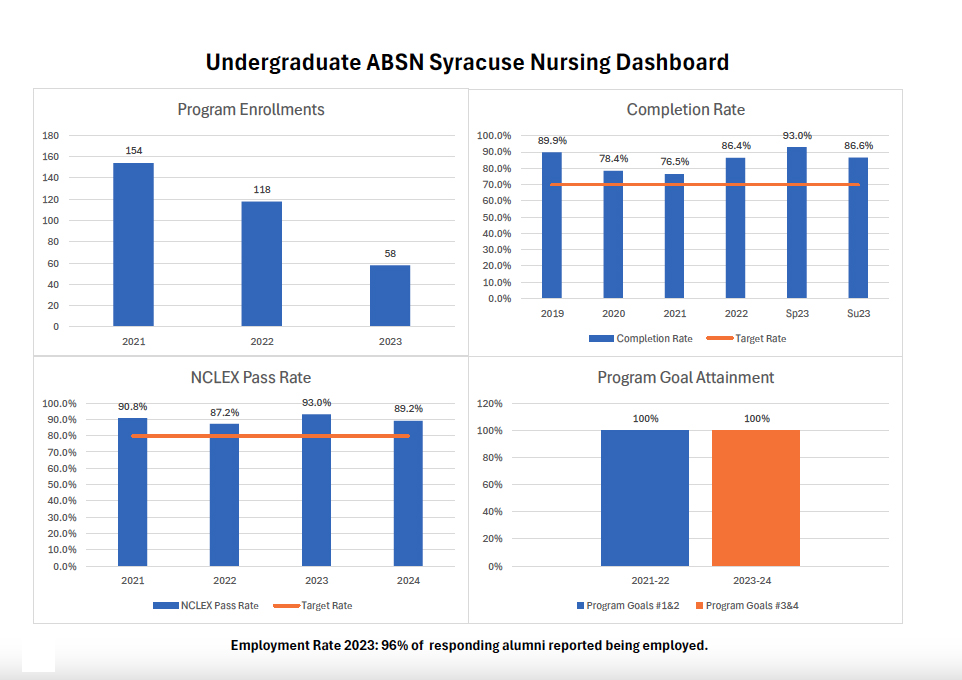
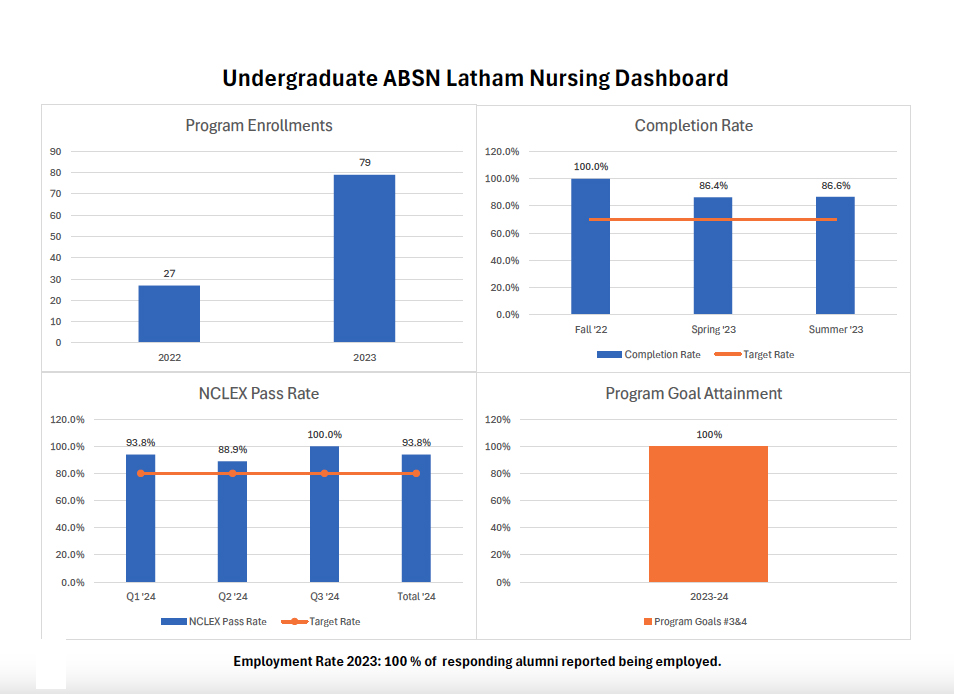
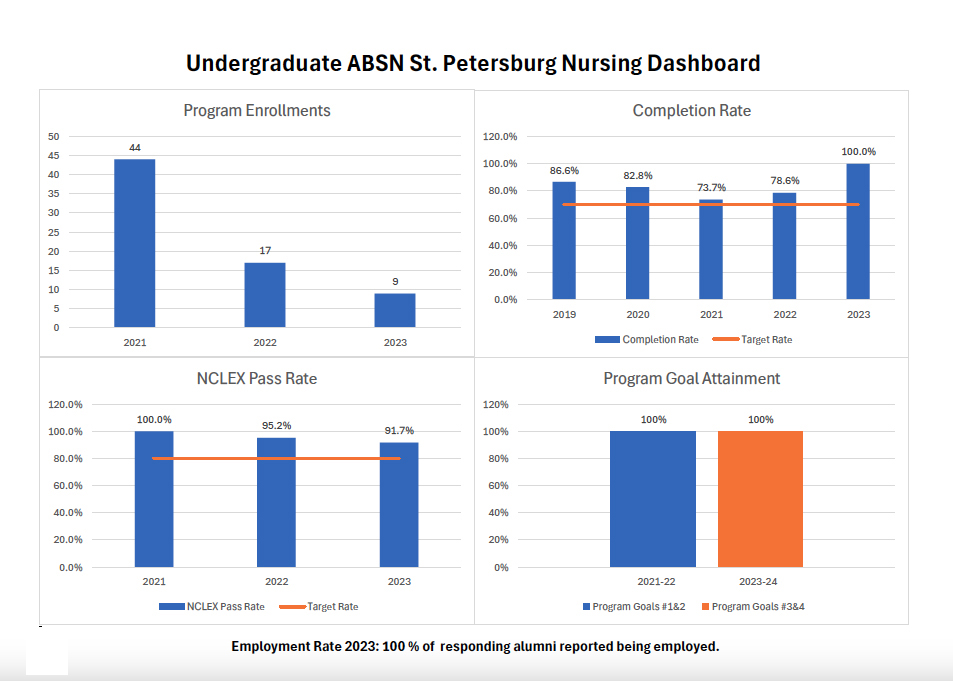
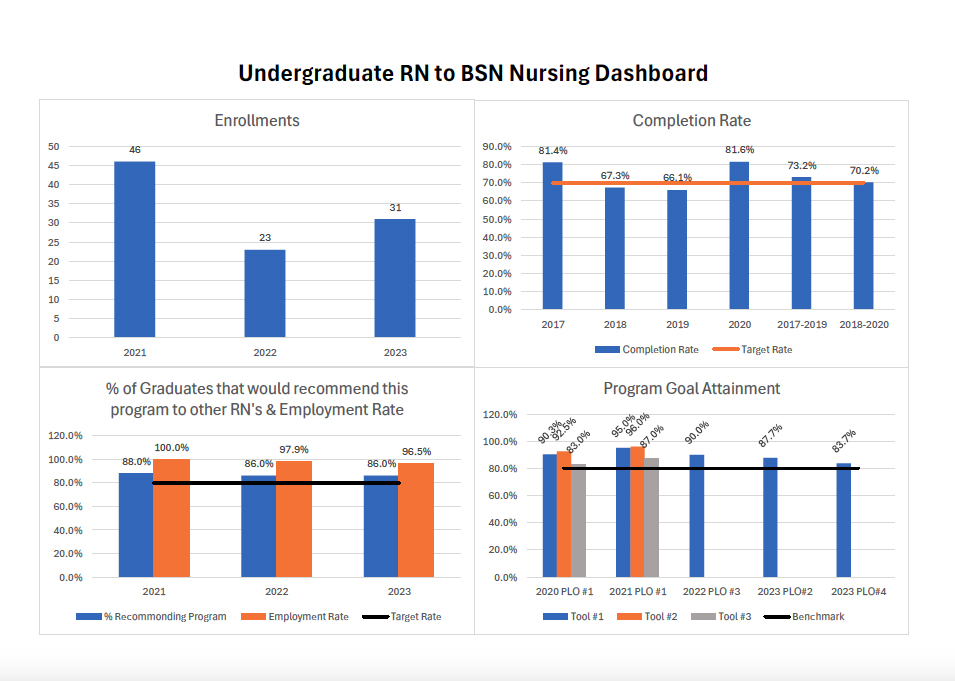
| Undergraduate Program | Completion Rates (Benchmark: 70%) | NCLEX Pass Rates (Benchmark: 80%) | Attainment of Program Goals | Employment Rates (Benchmark: 80% of responding graduates seeking employment secured employment) | Cohort Inclusion Parameters | ||
|---|---|---|---|---|---|---|---|
| Traditional Track | 2018: 100% 2019: 100% 2020: 92% | 2022: 87% 2023: 93.3% 2024: 92.1% | PG #1 and #2 2023-24: | Spring 2023: 100% | Beginning of second semester | ||
| ABSN Track (Syracuse/ Liverpool location) | 2019: 89.9% | 2021: 90.8% 2022: 87.2% 2023: 93% 2024 89.2%* *incomplete cycle | PG #1 and #2 2021-2022: 100% PG #3 and #4 2022-2023: 100% attainment | 2021: | 2022: | 2023: 96% | After 13 completed credits |
ABSN Track (Latham/Albany location) (Program began 8/2022) | Fa22: 100% Sp23: 86.4% Su23: 86.6% | First graduating cohort - December 2023 *incomplete cycle | PG #1 and #2 | 2021: | 2022: | 2023: 100% | After 13 completed credits |
| ABSN Track (St. Petersburg FL location) | 2019: 86.6% 2020: 82.8% 2021: 73.7% 2022: 78.6% 2023: 100% | 2021: 100% 2022: 95.2% 2023: 91.7% 2024 Q1 - 3: 83.3%* *incomplete cycle | PG #1 and #2 2021-2022: 100% attainment PG #3 and #4 2023-2024: 100% attainment | 2021: | 2022: | 2023: 100% | After 13 completed credits |
| RNtoBSN Track | 2017: 81.4% 2017-2019: 73.2% 2018-2020: 70.2% | N/A | PLO #1 PLO #2 PLO #3 PLO #4 | 2021: 42/42 = 100% | 2022: 48/49 = 97.9% | 2023: 96.5% | After 6 credits |
| Undergraduate Aggregate Data | 80.4% (2018-2020) | 98.5% | |||||
| Advanced Standing/TBSN Track (Latham/Albany location) | NO DATA YET | NO DATA YET | NO DATA YET | NO DATA YET | Beginning of second semester | ||
Graduate Nursing Program Outcomes
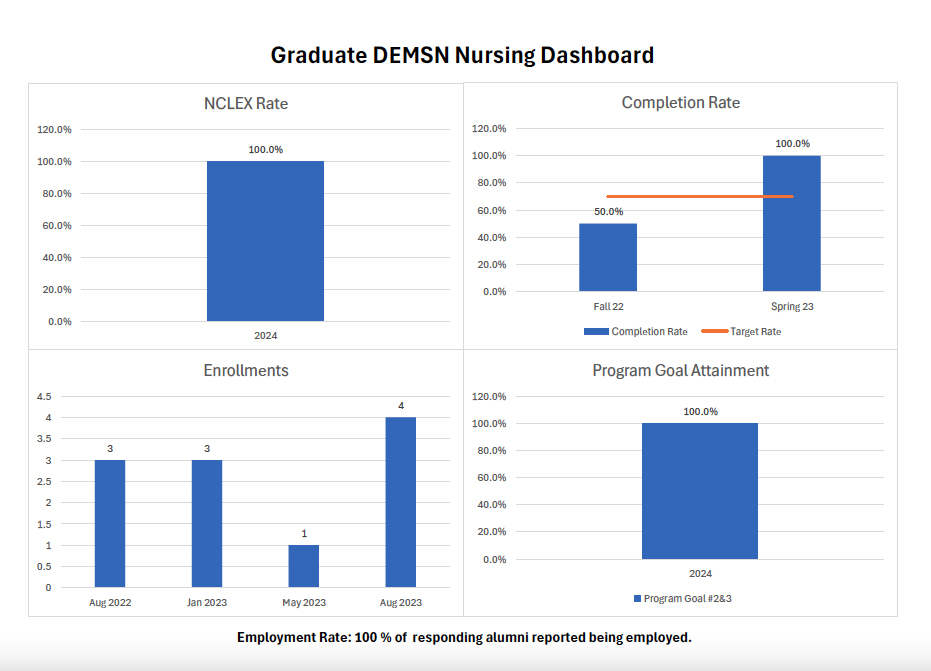
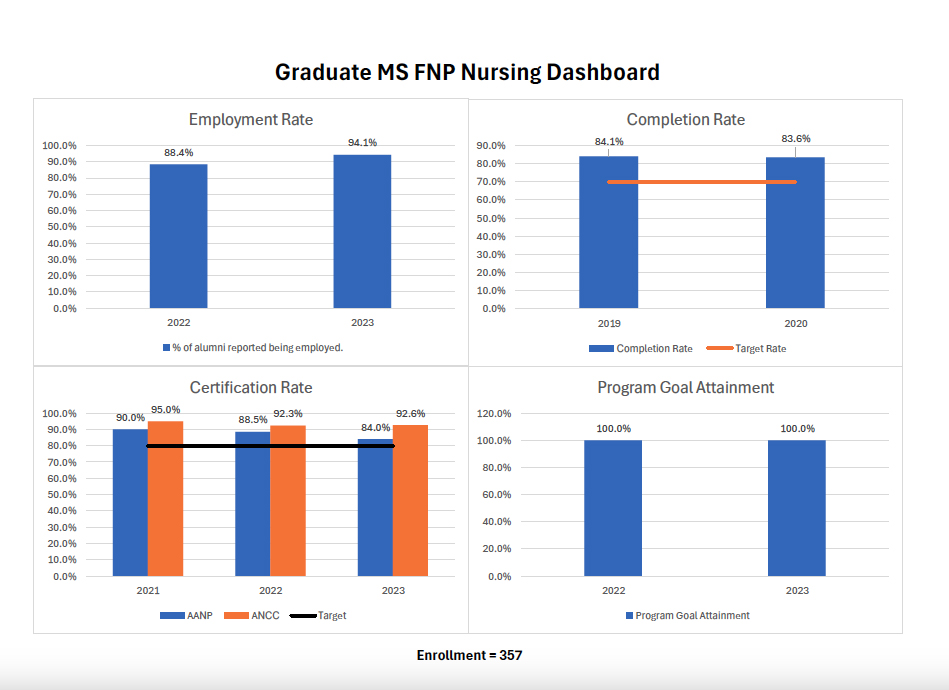
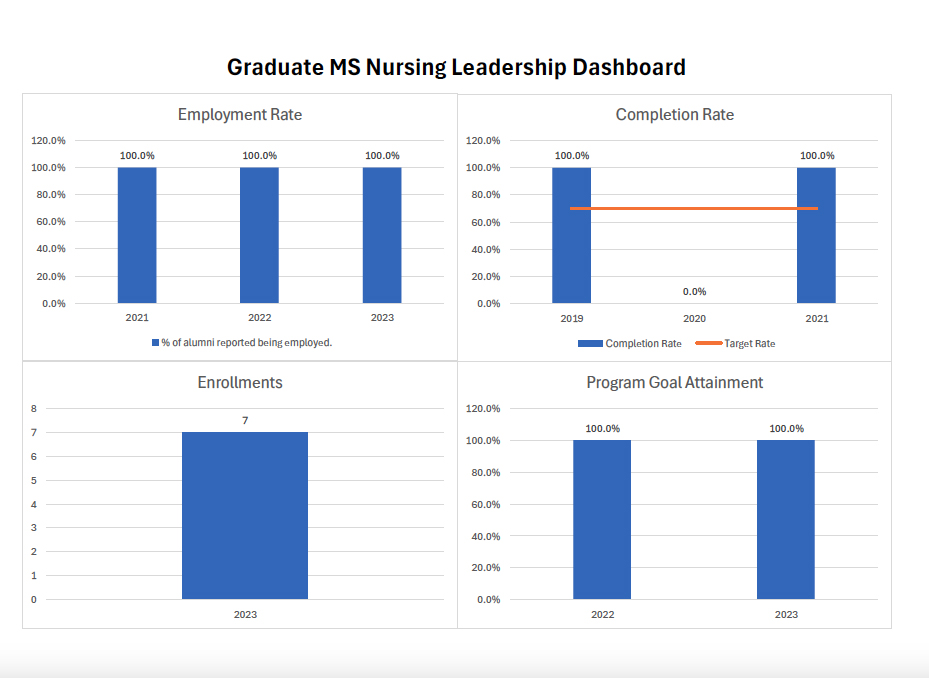
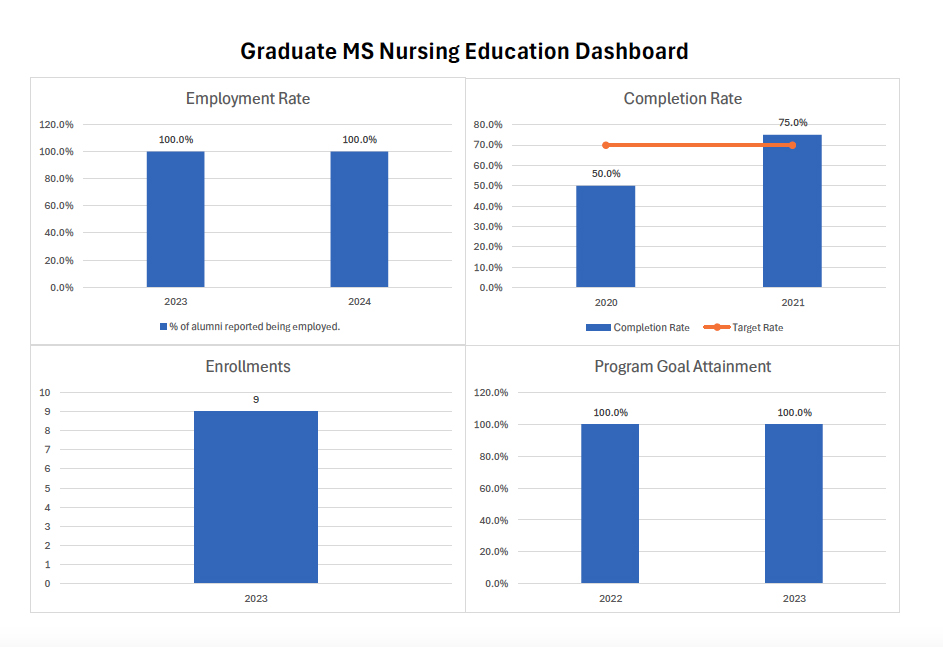
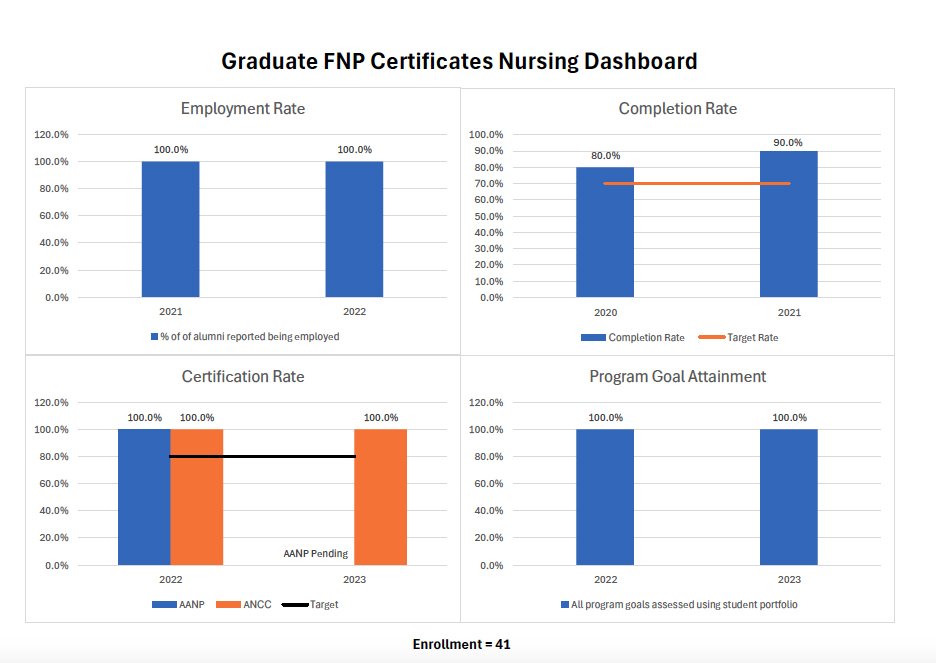
| Graduate Program | Completion Rates (Target: 70%) | Licensure Rate (Target FNP only: 80%) | Program Goal Attainment | Employment Rates | Cohort Inclusion Parameters |
|---|---|---|---|---|---|
| DEMSN Track (St. Petersburg, Fl location) (began Fall 2022) | 2022: 50% *incomplete cycle | 2024: Pending (First year of graduates; 100% thus far) | PG #2 and #3 2024: 100% | 2024: 100% | After 15 completed credits |
| Graduate Program | Completion Rates (Benchmark: 70%) | Certification Rate (Benchmark: 80%) | Program Goal Attainment | Employment Rates | |
| MS FNP Track (online) | 2019: 84.1% 2020: 83.6% 2021: Pending | 2021: AANP 90%; ANCC 95% 2022: AANP 88.5%; ANCC 92.3% 2023: AANP 84%; ANCC 92.6% | 2022: 100% 2023: 100% | 2023: 88.4% 2024: 94.1% | After 15 completed credits |
| MS Nursing Leadership Track (online) | 2019: 100% | N/A | 2022: 100% 2023: 100% | 2021: 100% 2022: 100% 2023: 100% | After 9 completed credits |
| MS Nursing Education Track (online) | 2020: 50% (1 out of 2) | N/A | 2022: 100% 2023: 100% | 2023: 100% 2024: 100% | After 9 completed credits |
| Graduate Aggregate Data | 2019-2020: 83.1% without DEMSN 2021 Not finished | 2021 - Overall Pass Rate 93.3% 2022 - Overall Pass Rate 90.3% 2023 - Overall Pass Rate 88.5 | 2023: 98% | ||
| Certificate Program | Completion Rates (Benchmark: 70%) | Certification Rate (Benchmark: 80%) | Program Goal Attainment | Employment Rate | Cohort Inclusion |
| CAS- FNP Track (online) | 2020: 80% 2021: 90% 2022: Pending | 2022: AANP 100%; ANCC 100% 2023: ANCC 100%; AANP does not report for less than 3 students | 2022: 100% 2023: 100% | 2021: 100% 2022: 100% 2023: unable to assess | After 15 completed credits |
| Certificate Aggregate Data | 2020-2022: 90.5%; Certification rate - 2021 No data; 2022: 100%* 2023: pending * incomplete data |
Note: This site provides links to other organizations as a service to our readers. Utica University Department of Nursing is not responsible for the information provided on other web sites.
Financial Aid & Scholarships
U.S. Department of Education's Federal Student Aid page
Collegeboard.com - paying for college
Scholarship Listings for Nursing Students at MinorityNurse.com
FastWeb! - free scholarship search
CollegeXpress - scholarship and loan searches
eStudentLoan.com
College Resource Network Nursing Scholarships
F.A. Davis Undergraduate Nursing Scholarship
Careers in Nursing and the Profession of Nursing
U.S. Department of Labor Occupational Outlook Handbook - Registered Nurses
Discover Nursing from Johnson & Johnson
NursingCenter
The Student Nurse Forum - support, information, resources and advice to guide you on your quest to becoming a nurse
National Council of State Boards of Nursing (NCLEX)
Pearson VUE - administrator of the NCLEX
Nursing Organizations
American Nurses Association
National League for Nursing
New York State Nurses Association
The American Academy of Nursing
American Association for the History of Nursing, Inc.
American Association of Critical-Care Nurses
National Student Nurses' Association
Transcultural Nursing Society
National Association of Hispanic Nurses
National Black Nurses Association
Nursing Online Resources
National Institutes of Health - health information search
New York State Department of Health
NOAH: New York Online Access to Health
Alcohol Effects, Addiction Treatment, and Resources
Virtual Hospital - a digital library of health information
WebMD Medical Library
MedicineNet.com - medical dictionary
Mesothelioma + Asbestos Awareness Center - The most update to date information about mesothelioma.
Gray's Anatomy of the Human Body - 1918 edition of book online
ECG Library
Drugs.com - drug information online
RxList - drug index
U.S. Food and Drug Administration
New York Times Health News
Reuters Health Information
American Cancer Society
National Cancer Institute
Mesothelioma Guide - a site that guides mesothelioma patients to better health care options and to finding a cure
RegisteredNursing.org - a nursing advocacy organization that offers a broad selection of tools, guides, and resources free of charge.
Caring.com is a leading senior care resource for family caregivers seeking information and support as they care for aging parents, spouses and other loved ones. We have been featured on the Administration for Community Living, AARP, Forbes, and is referenced by many governmental agencies and organizations across the internet.
Ultimate List of Discounts for Nurses - This list contains discounts from 200+ stores on everything from counseling services to yoga programs and even new mattresses.
Why nursing?
If you are thinking about a career that will involve caring for others, promoting health and wellness, and diagnosing and treating human responses to actual or potential health problems, then you may be up to the challenge of nursing. If caring were enough, anyone could be a nurse. Nursing is a combination of heart and smart – having warmth, compassion, and concern for human dignity combined with the ability to handle the intellectual rigor of nursing theory and science integrated with the natural and social sciences.
What can a career in nursing offer me?
In addition to the personal satisfaction of knowing you have made a real difference in the lives of others, nursing is a profession that challenges you to be your best. It offers unlimited job opportunities and career advancement, job security, flexibility in work schedules, and a competitive salary.
We are currently in the midst of one of the most severe nursing shortages ever experienced in the United States, and projections for the future are alarming. The US Bureau of Labor Statistics (2018) projects 1.1 million additional nurses are needed to avoid a further shortage. Employment opportunities for nurses are projected to grow at a faster rate (15%) than all other occupations from 2016 through 2026 (US Bureau of Labor Statistics, 2018).
Other than hospitals, schools, and doctors’ offices, where do nurses work?
Today’s nurses work in a variety of settings, including emergency rooms, forensic and correctional facilities, acute care facilities, long-term care facilities, health care agencies, community clinics, school systems, government agencies, research labs, insurance agencies, and private practice offices. They can work in large urban areas, remote rural locations, or other countries. Nurses can enter into advance practice roles such as certified nurse midwives, nurse practitioners, clinical nurse specialists, nurse anesthetists, researchers, legal nurse consultants or health policy analysts. They can elect to teach college or enter administration as executives of health care agencies. Nursing is truly a lifelong profession, and the possibilities are endless.
Aren’t nurses primarily assistants to physicians in medical settings?
Definitely not. Over the past 50 years, nursing has progressed from an occupation to a fully licensed independent profession separate from medicine. Nurses work collaboratively with physicians and other health care professionals as colleagues in health care to assess, diagnose, and treat individuals and families.
Why study at Utica University to become a nurse?
Quite simply, because the Utica University Department of Nursing has enjoyed many years of success in terms of student satisfaction, graduate professional accomplishment, and employer satisfaction.
The nursing program offers many benefits, including:
- A four-year program leading to a Bachelor of Science degree in nursing
- An Accelerated Bachelor of Science degree in Nursing (ABSN) for students who hold a bachelor's degree in another field and want to achieve a BS in nursing
- An online RN to BSN program
- A Master of Science degree in nursing in the areas of Family Nurse Practitioner (FNP), nursing education, and nursing leadership
- Cutting-edge curricula
- Separate courses available only in a baccalaureate nursing program such as health assessment, community health, nursing management, critical care nursing, research methods, and statistics.
- A strong clinical focus
- Small nursing classes
- Highly qualified faculty who hold a minimum of a master’s degree in nursing and/or doctoral degrees. All faculty are actively involved in clinical practice and/or research.
- Commitment to advising and mentoring. All matriculated students are assigned a nursing faculty advisor before their first semester on campus. Students are encouraged to meet with their advisors frequently—not just for course registration.
- Commitment to advising and mentoring
- Diverse student body
Will I have time to be on an athletic team and still fit in all of my classes and clinicals as a nursing major?
YES! Many campus-based nursing students participate in team sports at Utica University. In fact, it is not uncommon for a nursing major to be captain of a team. Some team sports with nursing representation include football, basketball, swimming, ice hockey, soccer, field hockey, softball, and lacrosse.

Located in Utica University's F. Eugene Romano Hall, the Dr. Albert and Gloria Shaheen Nursing Laboratory is a cutting-edge educational facility that features:
- Fully equipped reproduction of a modern hospital ward with nursing station, bedside monitoring and respiration technology, and more
- Isolation room with state-of-the-art diagnostic and vital sign monitoring equipment
- Smart classroom
Take A Virtual Tour:
More about the Nursing Lab:
General:
- State-of-the-art 3,050 square-foot lab facility
- Natural light from
multiple windows - Located in F. Eugene Romano Hall, rooms 202A and 202B
See campus map
Main resources:
- Examination bay - features 6 exam tables and 6 wall mounted diagnostic systems (instrumentation for examining ear, nose and throat)
- 10 bed section (Romano 202A) - features over-bed tables, bedside cabinets for skills practice and clinical simulation which includes wall mounted headwall systems (oxygen, compressed air flow meters and suction regulators)
- Classroom area (Romano 202B) - fully equipped with DVD/VCR unit, ceiling-mounted projector, pull-down screen, and laptop computer
- Nursing station - simulates hospital conditions to include references, computers, patient charts and paperwork from area health care facilities
- Multipurpose exam room - can serve as an isolation room, physician’s exam room or critical care room with a bedside monitor
- Conference meeting area - for both student and faculty meetings and discussions
- Secure storage room - for lab equipment and supplies
Other important features:
- Sinks at both ends of the nursing lab and in the exam room
- Room divider for maximum flexibility
- Patient-friendly color scheme (Viva Gold, Baked Clay, Accessible Beige)
Each patient care bed features:
- USB port
- nurse call light
- privacy curtains
Equipment includes:
- IV pumps (Abbott, Alaris, Baxter, IMED)
- PCA pumps
- Epidural pump
- Enteral feeding pumps
- Crash cart/medication cart
- Stryker stretcher
- Crib
- Bedside commode
- Crutches
- Walkers
- Wheelchairs
- Flat screen TV for debriefing scenarios
State-of-the-Art Training Manikins
Also on our list of critical equipment is state-of-the-art training manikins. These include:
- Vital-Sim Nursing Baby
- Nursing Kid
- Nursing Anne
- Nursing Kelly
- Sim-Man (our latest addition), currently installed in the exam room
These manikins are introduced to the students in assessment class and will be utilized in each nursing course for clinical simulation and skills practice. See specific descriptions and features.
Contact Us
Doreen Rogers DNS, RN, CNE

Doreen Rogers DNS, RN, CNE
Nursing Department Chair
(315) 792-3119
Marsela Mehkic MS, RN

Marsela Mehkic MS, RN
Director of ABSN and DEMSN
(315) 223-2336
James J. Monahan MS, RN, EMT-P, CHEC

James J. Monahan MS, RN, EMT-P, CHEC
Director Traditional Nursing and Advanced Standing Programs
(315) 792-3530
Amy Haver MS, RN, FNP-BC

Amy Haver MS, RN, FNP-BC
Director, RN to BSN Program
(315) 792-3314
Janice Ceccucci, DNP

Janice Ceccucci, DNP
Director of Graduate Nursing Programs
(315) 792-3059
Elizabeth Spooner Dunn, M.S.

Elizabeth Spooner Dunn, M.S.
FNP Practicum Coordinator
(315) 792-3452
I would like to see logins and resources for:
For a general list of frequently used logins, you can also visit our logins page.
